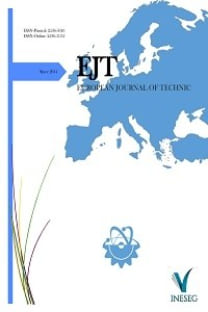PERFORMANCE STUDY OF FOUR EQUALIZATION TECHNIQUES OVER A WIRELESS COMMUNICATION CHANNEL
intersymbol interference(ISI); LMS and RLS algorithms; linear equalizers decision feedback equalizers,
___
- [1] John, P., Masoud, S., "Digital Communications," McGraw-Hill, Fifth Edition, ISBN 978-0-295716-7-ISBN- 0-07-295716-6, 2008.
- [2] Garima, M., Amandeep.S, S., "Adaptive Equalization Algorithms: an Overview," International journal of advanced computer science and applications. vol. 2, no. 3, march 2011 (ijacsa).
- [3] Ardavan. M, T., Babak, H., John, C., "Adaptive Equalization of Multiple-input Multiple-output (mimo) Frequency Selective Channels,".vol. 1, IEEE 1999.
- [4] S, Dileep Kumar., G B S R, Naidu., V ,Jagan Naveen., "Adaptive Channel Equalizer for Wireless Communication System," international journal of electronics and communication engineering (ijece). vol. 2, issue 5. nov 2013, 159-166.
- [5] Sireesha, N., K, Chithra., Tata, S., "Performance Analysis of Linear Recursive Least Squares Adaptive Filter to Mitigate Multipath Effect".Proceedings of Sympol- 2015.
- [6] Luca, R., Paolo, B., Geert, L.,"Simple Equalization of Time-Varying Channels for OFDM, " IIEEE Communication Letters. vol. 9, no. 7, July 2005 .
- [7] Wing. S, L., Umberto. M, F., Desmond P, T., "Equalization of Linearly Frequency-Selective Fading Channels," IEEE Transaction on Communication. vol. 45, NO. 12, December 1997 1501.
- [8] John E, S., Norman C, B., "Error-Rate Evaluation of Linear Equalization and Decision Feedback Equalization with Error Propagation," IEEE Transaction on Communication. vol. 46, no. 5, May 1998.
- [9] Ben, C.W.L., Khaled, B.L., "Adaptive Equalization and Interference Cancellation for Wireless Communication Systems," IEEE Transaction on Communication. vol. 47, no 4, April 1999.
- [10] Prachee, S., Kavitha, C., "Prediction of State Transitions in Rayleigh Fading Channels," IEEE Transaction on Vehicular Technology. vol. 56, no. 2, March 2007.
- [11] Mahmood. F, M., Aseel. M, A.,"Combination of LMS and RLS Adaptive Equalizer for Selective Fading Channel," European Journal of Scientific Research. Vol. 43, No.1 , (2010), pp.127-137.
- [12] Tero, I., Tobias. H, S., Mika, R., Markku, R., "Channel Equalization in Filter Bank Based Multicarrier Modulation for Wireless Communications," EURASIP Journal on Advances in Signal Processing, vo. 2007, Article ID 49389.
- [13] Darshna, K., Geeta, N., "Performance Analysis of Adaptive Channel Equalizer Using LMS, Various Architecture of ANN and GA," International Journal of Applied Engineering Research, vol. 12, Number 22, (2017), pp. 12682-12692.
- [14] Fazal, A., Salid, B., Muhammad, S., Qamar, I., "Effect of Variation in Filter Length on Adaptive Equalization in Frequency Selective Channels," International Bhurban Conference on Applied Sciences & Technology (IBCAST), Islamabad, Pakistan. 13th -17th January, 2015.
- [15] Shruti R, P., Sandip R, P., Hiren, M., "Comparative Study of LMS & RLS Algorithms for Adaptive Filter Design with FPGA," Progress In Science in Engineering Research Journal ( PISER) 11, vol. 02, p 185-192 .
- [16] Md, Khajababu., Y, Padma Sree.,G V, Sridha., "Channel Equalization of Adaptive Filters Using LMS and RLS Algorithms," International Journal of Advanced Technology in Engineering and Science, vol. 03, Issue no. 01, January 2015.
- [17] Jyoti, D., Shadab, A., Kuldeep, G., "Comparison between Adaptive filter Algorithms (LMS, NLMS and RLS) ," International Journal of Science, Engineering and Technology Research (IJSETR) vol 2, Issue 5, May 2013.
- ISSN: 2536-5010
- Yayın Aralığı: 2
- Yayıncı: INESEG Yayıncılık A.Ş.
FEASIBILITY OF GOLD BASED HALL DEVICES FOR BIOSENSING PURPOSES
Hüseyin BEYTÜT, Selçuk KARAGÖZ, Serkan ÖZEL
IDENTIFICATION OF PARKINSON’S DISEASE BY AR MODELLING OF GAIT SIGNALS
INVESTIGATION OF ROUTE TRACKING PERFORMANCE WITH ADAPTIVE PID CONTROLLER IN QUADROTOR
